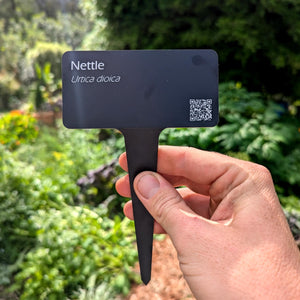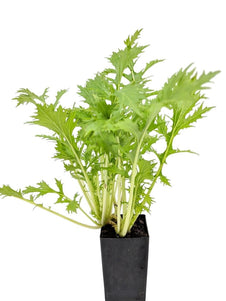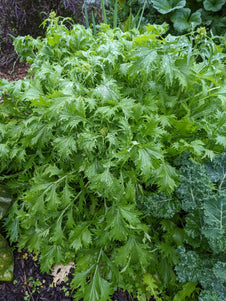



Asian Greens - Mizuna
Asian Greens - Mizuna

- In stock, ready to ship
- Inventory on the way

Usually available: April to November
Life cycle: Annual
Height: 30 - 45cm
Position: Sun / part shade
Soil preference: Moist / well drained
This is how we pack and send your Herb Plants to all states except TAS & WA
You will receive
- 1 Asian Greens - Mizuna Herb Plant in a 50 X 75mm tube - General growing instructions
All of our Herb Plants are grown organically with certified organic potting mixes and fertilizers
Botanical Name: Brassica species
Mizuna is a leafy green vegetable belonging to the Brassica genus. The leaf structure is usually deeply serrated, to create a crinkled or feathered appearance. Although most varieties are light to dark green, there are some with interesting purple tones. The mature height of Mizuna is usually between 30-45 cm and 20-30cm wide. Many are harvested for the young leaves when they are only half this size. The flowers are yellow with four petals, similar to those of broccoli and typical of the Brassica genus. They grow well as natural biennials, but some adapt to local conditions by acting as annual plants.
Many Mizuna Mustard varieties are cultivated in Japan for modern culinary purposes. As global migration increases, people across the globe have come to appreciate these Japanese ‘water greens’. Many have been cultivated for hundreds of years in Japan, although their botanical origins are usually China or the Himalayan region of India. Some are known as Ancient Greens due to the evidence that they have been consumed for up to 5000 years in their native regions.
The Mizuna varieties are considered to be the mildest of the Mustard Greens. The word ‘mizu’ means water and ‘nu’ means mustard, translating from the Japanese word for mustard plant. There are up to 16 varieties of Mizuna and Mustard greens from two main species of Brassica. The true mustards belong to the Brassica juncea species, with some other leafy Mizuna greens having a similar spicy taste. The Mizuna are usually identified as either Brassica rapa var. japonica or Brassica rapa var. nipposinica. They may be called Japanese Potherb, Kyona, Japanese Mustard, Spider Mustard or Californian Peppergrass. Often common and botanical names are used interchangeably or as synonyms. It is often best to identify plants visually and work out which are your favourites.
Growing Conditions
The Mizuna greens and other leafy Brassica species of Asian origins are generally quick growing plants. They may reach maturity within 40-45 days and can be harvested for young leaves after 20 days. Harvests may be ongoing for as long as the plant produces new leaves or as quickly as new plants can grow. This is in contrast to the Western style Brassicas, such as cabbage and broccoli which take many months to produce a single mature plant for harvest.
These leafy greens can be harvested at maturity as a whole clump, with some young leaves being taken occasionally. Alternatively, they can be used as ‘cut and come again’ greens by cutting the young leaves, or larger ones if needed, from the clump. The remaining leaves will continue to grow and new branches will also continue to grow. They are known as Microgreens (or sprouts) if grown on a special growth medium and harvested at a young and ‘micro’ size after 5-14 days. Many people sow seed regularly in special garden beds or in seed trays, so they can harvest Microgreens daily, for their health benefits.
Most of the leafy green Brassica species prefer to grow in partial shade, rather than full sun. They need only 3-5 hours direct sun per day, so this provides the option to grow nutritious edible plants in shady gardens. If shade is not available, full sun is acceptable but some protection may be needed in warm Australian spring or summer weather. The Mizuna greens are water loving plants, so adequate and regular moisture will help plants through warm conditions. Soil should be fertile, but most soil types will produce good results if organic matter is added. Leaf crops require nitrogen in the soil to assist their rapid growth, so a nitrogen source may need to be added.
Most of the Mizuna greens are tolerant of extremes of hot and cold weather. However, they are most comfortable with cool seasons and plentiful water, given this reflects their native habitats as cool climate plants. They are often biennials in their native habitat, have a long growing season and will self seed if allowed to do so. Successive planting of seedlings or sowing of seed can be carried out every two weeks, providing a harvest for most of the year. Avoid the very hot and very cold months, since plants approaching maturity in these times will tend towards rushing to flower and bolt to seed. There are some varieties that are more tolerant than others, which are less likely to bolt. It may be discovered that some varieties will perform best as annuals planted at varying throughout the year or just as cold season annuals. Sow seed when soil temperatures are between 15 C and 25 C for best results. These vegetables will also do well in containers if garden space is at a premium.
Culinary Uses
Many people have eaten Mizuna in a salad, perhaps assuming they are eating some kind of ‘fancy lettuce’. They are often included in pre-packaged Mesclun Salad mixes, recognizable by their distinct leaves and spicy taste. However, these versatile greens stretch far beyond the salad bowl. They may be used as substitutes for most of the more common leafy green vegetables, such as spinach, in cooked dishes. Alternatively, they may be used along with other greens to add a mild spicy flavour to any dish.
Some have a stronger flavour than others, so it is worth experimenting. The older leaves may have a bitter taste which can be altered by cooking lightly or adding dressings. Try adding your selection to steamed vegetables, stir fries, soups, stews and meat dishes. They can also liven up sandwiches and fruit based dishes. The young leaves have a milder taste and leaves can be harvested as needed, while the rest of the clump continues to grow.
Medicinal Uses - Health Uses
Mizuna greens have a number of health benefits and are considered by many to be one of the ‘super foods’. They are highly recommended by health experts. One cup of Mizuna greens can provide high quantities of Vitamins A, C, E and K as well as minerals like folate, iron and manganese. These plants contain glucosinolates, which are phytonutrients involved in the suppression of enzymes that stimulate carcinogens. As well as these potential cancer fighting benefits, the Mizuna vegetables have shown to be of use as antioxidants and anti-inflammatory agents. Another valuable health benefit has been identified in the potential of Mizuna greens to lower cholesterol by affecting the metabolism of bile acids.
All information provided on this website is for informational purposes only. Please seek professional advice before commencing any treatment.





